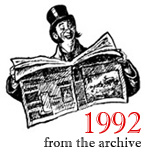
On Gary North, Texas Fundamentalist
ANALYZING THE MORAL DEFENSE OF FREE MARKET CAPITALISM — PART I
In recent years there has been a resurgence of free market economics in the U.S., including the Christian community. Numerous authors defend free market capitalism as the most Christian economic system, basing their arguments upon Scripture and theology in addition to economic theory. For example, the recently founded Contemporary Economics and Business Association states that it is “dedicated to the study of CHRISTIAN ECONOMICS — the combining of free markets, limited government and the cherished values of our Judeo-Christian heritage.” Its Advisory Board includes James Gwartney, author of the second-best-selling introductory economics textbook on college campuses today; Paul Craig Roberts, a founder of supply-side economics; Michael Novak, of the American Enterprise Institute; Jerry Falwell, Chancellor of Liberty University; and James Kennedy, Senior Minister of Coral Ridge Presbyterian Church.
Many Christian defenders of free market capitalism make good points, especially about the importance of individual freedom. However, their use of religious sources can be faulted on two basic points.
First, they are extremely selective about which texts they cite. They rely heavily on scriptural passages that tend to support unrestricted capitalism, and ignore or gloss over other important texts that point to its limitations. The full range of Christian wisdom in the area of economics is not used. Second, it can be questioned whether their reasoning is really derived from the sources they do cite. They sometimes take passages out of context, proof-text, or provide strained interpretations in order to support their previous allegiance to free market capitalism. Scripture and theology become ideological supports for positions reached without them, rather than true sources of reflection or prophetic critiques of cultural assumptions.
Christian defenders of free market capitalism also misuse economic theory in two areas. First, they don’t recognize that the existence of market failures undermines their free market arguments, and that in real life non-self-interested behavior is required for efficient market operation. Next, because markets are generally efficient, they jump to the conclusion that virtually any public intervention is inappropriate. They embrace a “slippery slope” argument — either completely free markets or central control of a nation’s economy. Many of their best arguments defend markets against central planning, but not against socially regulated capitalism. They seem to believe that one is equivalent to the other.
You May Also Enjoy
Is the economy supposed to serve man? Or are we to twist ourselves and our families to fit the impersonal demands of the economic juggernaut?
Socrates asks what would happen to a capitalist nation if everyone practiced the greedlessness of Jesus, or Buddha, or even Thoreau?
Cheerful giving lifts man from the cold, heartless realm of business transactions to a spiritual world of liberality and abundance.

